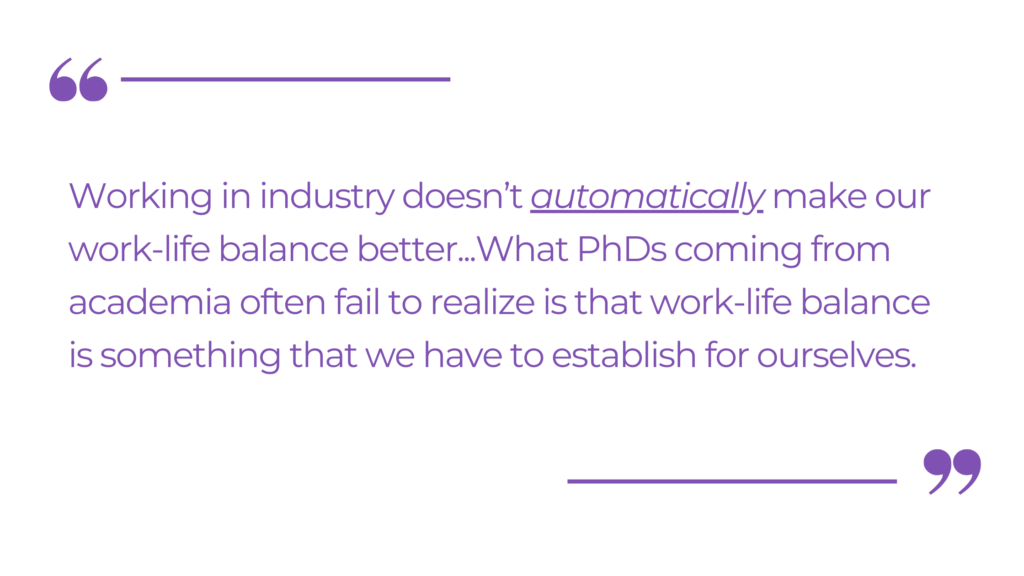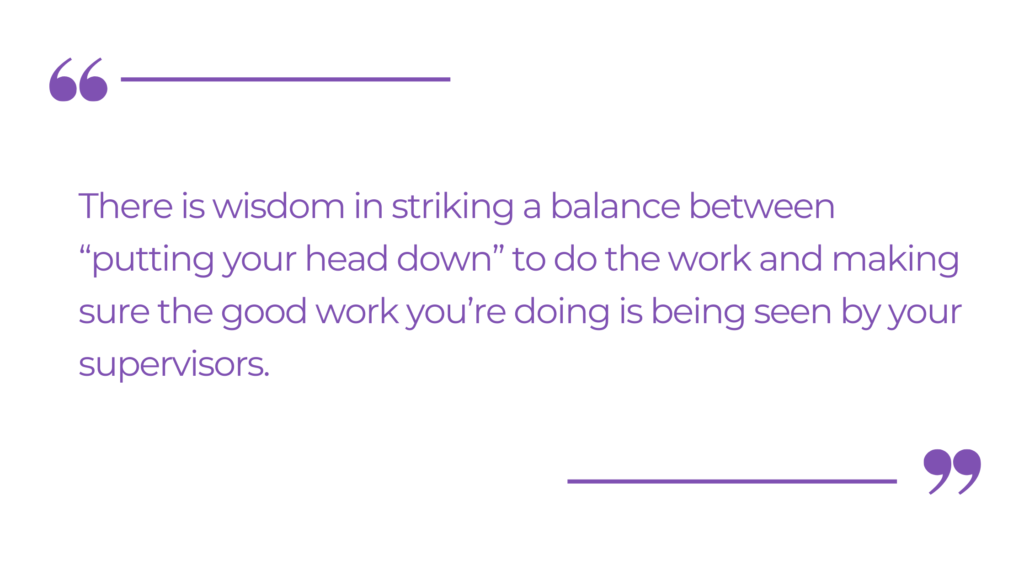
Working In Academia vs Industry: 7 Differences (Besides Salary) And How To Navigate Them
When I was thinking about transitioning to industry, I did what every PhD does best: I scoured the internet for anything I could find about working in academia vs industry.
Now that I’ve been in industry for 4+ years, I want to share my take on the differences between these two workplaces. It’s based on what stood out to me in hindsight (AKA “what I remember having the most trouble with”).
You’re probably familiar with some of these differences already. But they’re often not discussed in a way that gives suggestions for how to navigate them practically as a new PhD in industry.
That’s the part I felt like I was missing; so let’s change that for you. 🙂
Maybe you’re thinking about making the transition from academia to industry right now. Or maybe you’re already working in industry and the transition feels wonky, but you’re not entirely sure why.
My hope is that this article might pinpoint some possible sources of the wonkiness you’re experiencing, and also provide some explanation and practical tips you can try for yourself.
1. Academia and industry have different value systems
Academia and industry value different things. New PhDs are often surprised by this shift in what’s valued when working in academia vs industry.
Academia focuses on building knowledge and educating. Our objective during the PhD is to push at the boundary of what we know. (If you haven’t seen it, Matt Might does a great job of describing the PhD in comic form in The Illustrated Guide to a PhD.)
It’s also an environment for students to grow and develop scientific thinking. We focus on understanding theory and finding the “why” behind what we observe.
In contrast, the point of industry is to develop marketable products. That means that the focus is on making a product that works.
In industry, the emphasis shifts to what we – as employees – can do to bring more revenue to the company. This means that resources are confined to projects that are in line with business goals.
Of course, what this looks like can be different in each company. For instance, it can mean fewer opportunities for side experiments to uncover the “why” behind an observed phenomenon. (Often, it’s because deadlines are tight and we just don’t have the time for it – more on this further in the article.)
That’s not to say that discoveries don’t happen in industry. They may happen in the process, but the focus is not on uncovering new information. Developing something that works is the primary objective. Deep dives for understanding why that process works is secondary.
I’ll admit – sometimes it can still feel counterintuitive to how I was used to operating as an academically-trained scientist.
It’s not that one system is better than the other. But, it is important to make note of this shift in values when transitioning from working in academia to industry.
What it means for you: Understanding the different value systems between industry and academia is a huge first step. I found it helpful to focus on the practical problems I could solve for the company. Reframing your work that way will help you concentrate your efforts on what’s most impactful for the industry environment.
2. The pathway to success is different when working in academia vs industry
First, let’s address two elephants in the room. 1) Success looks different for everyone, and 2) how we think about success is easily a whole separate conversation. Here, I’m describing my experience and perception based on how I think about success.
In grad school, the pathway to advancing in my grad program felt clear to me. There were standardized milestones I knew I needed to meet to graduate.
Alternatively, the number of publications I had or the journals I published were also indicators of how prolific I was as a researcher. (Not debating here whether this is the “right” way to measure academic success… just stating another common academic metric.)
In industry, there isn’t a standard blueprint for success, advancement, or promotions in a company. Everyone’s path will look different. In fact, it may vary from company to company. Sometimes, it can even differ across teams in the same company or differ by manager.
Because the path to advancing in industry is more variable, it can be both freeing and frustrating. For me: I wanted my career to look a certain way. But I couldn’t pin down the “multi-step plan” I needed to follow, like I did with school.
I didn’t know what “boxes” I needed to check off anymore. And that subjectivity drove me nuts.
It takes time to figure out what your workplace values and how to pursue your version of success within that space.
What it means for you: The most important thing is to define your current career goals first. Next, identify someone in your company who most closely models that. Observe (in a non-creepy way) what makes them “successful” at your company. Then, figure out what makes sense for you to emulate. (If it’s not obvious – your critical thinking is key here.)
If you’re feeling frustrated or lost about navigating your specific work situation: Firstly, I feel you and there’s nothing wrong with you (and hopefully that’s coming through in this article). Secondly, I’d love to help you and provide an external perspective!

Pssst! Ready for a Challenge?
I have a guided email series where I break down the overwhelm of your transition into bite-size tasks you can do in 15 minutes / day.
3. Conversations around work-life balance are less taboo in industry
One distinguishing feature of working in academia vs industry is how work-life balance is perceived and practiced.
In academia, it can feel taboo to even bring it up. After all, if we love science, the hours don’t matter! Working all the time is the badge of honor. If we weren’t immersed in it 24/7, it could seem like we weren’t thaaat dedicated to our science.
In industry, it feels more socially acceptable to have work-life balance. People working in corporate environments tend to have structured 9-to-5 jobs. That said, there is a spectrum. Some workplaces (like startups) may swing towards longer work days.
More people in industry tend to have families, pets, and lives outside of work. Chances are, our coworkers have pets to pick up from daycare or a workout class scheduled at 5 PM. There’s less social pressure to stay plugged in to work at all times.
Now, it’s important to clarify that working in industry and being around more instances of work-life balance in action doesn’t automatically make our work-life balance better.
That’s a common misconception for academic PhDs looking at industry life from the outside.
What PhDs coming from academia often fail to realize is that work-life balance is something that we have to establish for ourselves. Unfortunately, I’ve seen many new industry PhDs struggle with this. Our habits will follow us…until we change them.
(I’ll have more to say on that in an upcoming article – stay tuned!)
What it means for you: This is a great time to reassess your thoughts and habits around work-life balance. You don’t have to feel bad about placing boundaries between your work and your life outside of work.
At the same time, it’s also not a cookie-cutter process. Each person’s version of work-life balance will look different. It’s most important to check in with yourself to see what is sustainable for you.

4. Teamwork is more prevalent when working in industry vs academia
Another difference to point out about working in academia vs industry is the amount of teamwork we participate in.
In grad school, we may collaborate with other researchers on a project. But our PhD is largely a solo venture. We prize working independently. We problem-solve on our own and manage our own project timelines.
In contrast, teamwork is a much bigger part of working in industry. Product design and development is complex and multi-faceted. It’s just not feasible for an individual to oversee everything from beginning to end. As a result, our contribution is a small part of a much larger puzzle.
What it means for you: When you’ve been used to working independently for years, it can be a big adjustment to coordinate with a team of people. Be mentally prepared to make a shift in how you work. Flexibility and communication will be your new best friends… and you’ll get to know them very well. 🙂
5. Timelines are different when working in academia vs industry
When I was still in grad school, I had heard that industry moves fast. But I didn’t fully comprehend what it meant.
In academia, we have months and years to work on a research project. We take a slower, methodical approach. After all, if we set up a poor experiment or overlook crucial steps, there could be big implications.
It may take extra time (and funds) to acquire materials again to repeat the experiment. Worse, we could set ourselves back months in our graduation timeline.
In contrast, timelines are generally much shorter when working in industry vs academia. Project decisions often need to be made quickly in industry, so speed is valued. Sometimes, it can feel like results were needed yesterday.
As a result, project leaders would rather see some “quick and dirty” preliminary results, even if the data is incomplete or the experiment is not planned perfectly.
Industry is also more result-driven. If results don’t look promising within a given (and usually shorter) time frame, the project can get scrapped in favor of a new idea or something else that works. It’s also common for project priorities to shift or the scope to change entirely.
What it means for you: It can be disorienting for PhDs when we’re used to being dedicated to a project and having years to work on it. It’s especially challenging when we’re also used to controlling the scope and timelines of our own academic projects.
Unfortunately, when you’re first starting in industry, you won’t get much say on timelines. The key is learn how to adapt to changes as they come, and to hold plans with an open hand. For PhDs, persistence here isn’t so much the challenge as it is learning to be okay with switching gears quickly.
Secondly, as timelines and projects morph, it’s also important to be clear on what your updated priorities are. If needed, ask for clarification and make sure your work stays aligned with current expectations.

6. Advocating for yourself looks different when working in industry vs academia
In fact, advocating for yourself might be an entirely new concept because you might have never needed to advocate for yourself in academia.
Here’s what I mean: in grad school – as long as we complete our graduation requirements, we predictably graduate with a degree. We’re also working closely with our PIs, who (in most cases) were invested in our growth and will help us stay on track with our theses.
Alternatively, we may not have much say to begin with. Our graduation is dependent on our PI and committee being on board with our work. We follow their instructions, because doing what they say will get us to the finish line.
In industry, advocating for ourselves looks different than how it did when we were working with our PIs. Advancement in the workplace isn’t as straightforward as checking off graduation requirements. Our supervisors are also not closely invested in our career path the same way a PI monitors our academic progress.
That means there’s a lot more that is hinged on finding and taking opportunities to advance ourselves. We’re in a sea of coworkers. And the reality is that our managers have their own workload and can’t be watching out for us the whole time.
We have to learn to promote ourselves and our abilities.
What it means for you: To be clear, I am not about attention-seeking in the workplace. I think it’s meaningful to do a job well, even if just for yourself. However, I do think there is wisdom in striking a balance between “putting your head down” to do the work and making sure the good work you’re doing is being seen by your supervisors. Not knowing how to do that can put you at a disadvantage.
If this is new for you, it can be helpful to start by 1) identifying what you’re good at, and 2) thinking about what you want to do in your job. Keep an eye out for opportunities that combine both elements, and proactively take those opportunities to showcase your skills.

7. Networking plays a big role in industry
The word “networking” makes me cringe. I almost didn’t want to include this section, because I still have so many mixed feelings about it.
When comparing working in academia vs industry – networking plays a much smaller part in the academic experience. We may collaborate on research projects, but we’re still mostly evaluated by our individual work. We plug away tirelessly at papers, presentations, and the thesis. At the end, we’re awarded the PhD.
That’s the meritocracy most of us are familiar with as academics. As someone who prefers to let her work speak for herself, I also liked to think that merit is enough to get me where I want to go in my career.
But in industry, meritocracy the way we’re used to thinking about it in school is nearly non-existent.
In industry, it’s not always about how much work we do or how knowledgeable we are. You cannot guarantee success or promotions just by working hard or doing a good job. (Side note: you also can’t guarantee it just by networking. Isn’t life complicated? 🫠 )
A big part of working in industry is about making connections with people who can be in our corner to help us as we progress in our careers. This can apply to our managers, and also the colleague two cubicles over who thinks of us when they hear about an opportunity that’s up our alley.
Who you know (and who knows you) in industry has the ability to impact the opportunities that come your way.
What it means for you: While I firmly do NOT believe in “networking your way” through your career (I honestly don’t even know what that would look like), its significance in industry should not be understated. At the very least, it’s something to be mindful of.
If networking is a cringe-worthy topic for you (*raises hand*): I found it helpful to think of networking as positioning yourself to help others. By extension, you’re building rapport with people who can help you when needed. This way, you’ll know who to turn to when you need expertise on a subject matter or need external support for your career objectives.
Lastly – start small. Start with coworkers in your immediate circle. True connections don’t happen overnight, so give it time to develop.

I hope this deep dive into the differences between working in academia vs industry helped provide more context for the environments that PhD scientists find themselves straddling.
If you’re currently working in industry and trying to figure out why it feels so disorienting – maybe this will help you pinpoint the culprit. In the very least, I hope that digging into these distinctions between working in academia vs industry helped equip you with some new tools for your industry transition.




Add A Comment